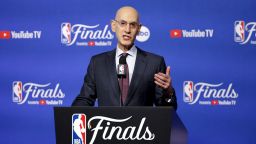Science
NCAA Faces Deadline on Controversial Gambling Rule Change

The NCAA must make a critical decision by November 21, 2023, regarding a proposed rule change that would permit college athletes and staff to place bets on professional sports. This comes amid rising allegations of sports gambling across various leagues, including Major League Baseball and the NBA. Many in college athletics are skeptical about the proposal’s approval, with one unnamed coach expressing doubt, stating, “There’s no way that happens, right?”
To block the proposed change, two-thirds of the Division I member schools must submit their opposition by 5 p.m. ET on the deadline date. According to a source, the NCAA is currently falling short of this threshold, needing responses from 241 out of 361 Division I schools. If the requisite number of schools does not respond, the rule change will automatically take effect on November 22.
Historically, college athletes, coaches, and staff members have been prohibited from betting on any sport overseen by the NCAA. While horse racing has been an exception, activities involving baseball, football, basketball, and hockey have not been allowed. The NCAA argues that as sports betting becomes legal in an increasing number of states, maintaining a blanket prohibition on betting for college athletes no longer aligns with the current environment. It is important to note that betting on college sports would still remain prohibited.
Roberta Page, director of athletics at Slippery Rock University and chair of the Division II Management Council, stated, “This change recognizes the realities of today’s sports environment without compromising our commitment to protecting the integrity of college competition or the well-being of student-athletes.”
Originally, this change was set to go into effect on November 1. However, the situation escalated when federal authorities unsealed an indictment that implicated members of three New York crime families, including two NBA players and an NBA head coach, in connection with two separate gambling schemes. This revelation prompted immediate backlash against the NCAA’s proposal.
Greg Sankey, commissioner of the Southeastern Conference, expressed his concerns in a letter to NCAA president Charlie Baker, urging the organization to reconsider its position. “On behalf of our universities, I write to urge action by the NCAA Division I Board of Directors to rescind this change and reaffirm the Association’s commitment to maintaining strong standards that keep college participants separated from sports wagering at every level,” Sankey wrote, as reported by ESPN.
Three days later, the NCAA announced a delay in its decision, citing that less than 75 percent of the cabinet members voted in favor of the new rule. This prompted an automatic 30-day rescission process. Interestingly, despite the SEC’s opposition, the two cabinet members representing the conference—Jeremiah Donati, athletic director at South Carolina, and Matt Boyer, SEC assistant commissioner for compliance—voted in favor of the proposal.
During the subsequent weeks, serious allegations surfaced as two MLB pitchers were indicted for game rigging, alongside six college basketball players from three different schools who were permanently banned from NCAA competition for game fixing.
On Thursday, the New Jersey Attorney General’s office announced that 14 individuals, including student athletes, faced charges for operating an illegal online sports betting scheme linked to members of the Lucchese crime family.
As the NCAA approaches its deadline, the implications of its decision could significantly impact the landscape of college athletics and the integrity of competition. The pressure is mounting as stakeholders await clarity on a matter that could reshape sports betting regulations at the collegiate level.
-

 Science3 weeks ago
Science3 weeks agoOhio State Study Uncovers Brain Connectivity and Function Links
-

 Politics3 weeks ago
Politics3 weeks agoHamas Chief Stresses Disarmament Tied to Occupation’s End
-

 Entertainment3 weeks ago
Entertainment3 weeks agoMegan Thee Stallion Exposes Alleged Online Attack by Bots
-

 Science4 weeks ago
Science4 weeks agoResearchers Challenge 200-Year-Old Physics Principle with Atomic Engines
-

 Entertainment3 weeks ago
Entertainment3 weeks agoPaloma Elsesser Shines at LA Event with Iconic Slicked-Back Bun
-

 World2 weeks ago
World2 weeks agoFDA Unveils Plan to Cut Drug Prices and Boost Biosimilars
-

 Top Stories3 weeks ago
Top Stories3 weeks agoFederal Agents Detain Driver in Addison; Protests Erupt Immediately
-

 Business2 weeks ago
Business2 weeks agoMotley Fool Wealth Management Reduces Medtronic Holdings by 14.7%
-

 Business3 weeks ago
Business3 weeks agoHome Depot Slashes Prices on Halloween Favorites Up to 75%
-

 Entertainment2 weeks ago
Entertainment2 weeks agoBeloved Artist and Community Leader Gloria Rosencrants Passes Away
-

 Top Stories3 weeks ago
Top Stories3 weeks agoOrioles Hire Craig Albernaz as New Manager Amid Rebuild
-

 Business2 weeks ago
Business2 weeks agoShutdown Impacts Millions as Deadline Approaches, Pressures Congress









